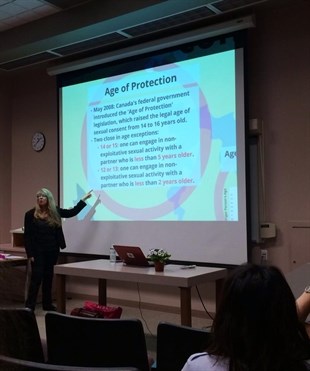
Diane Sowden presenting in Penticton on Friday.
(MEAGHAN ARCHER / iNFOnews.ca)
April 15, 2014 - 9:39 AM
PENTICTON — Last week parents got a lesson on online sexual predators and how to protect their children from sex exploitation as part of Victim’s Awareness Week.
Sexploitation has been a problem in Penticton, and still is with school age kids and youth.
The numbers of sexploitation cases are going up every year, said Diane Sowden.
“It can happen so quickly,” she said.
Sowden, the executive director of Children of the Street Society, an organization helping youth victims of sex trafficking and exploitation, gave a presentation in Penticton last week as part of Victim Awareness Week. The event was organized by The South Okanagan Victim Assistance Society and the Okanagan College Women’s Resource Centre.
Parents and teachers can educate not just their kids, but themselves on prevention and consequences on posting nude or revealing videos and pictures online.
Sowden, whose own daughter got lost in the Vancouver sex trade industry at age 13, talked to parents, educators and community members Friday about the dangers of online predators and the way social media is changing the way youth explore their sexuality.
She pointed out a difference between online predators—strangers who seek out youth for sex—and sexting between youth, which often involves two teenagers sharing sexual photos via social media or text message. But both are happening and both are a problem.
Youth are turning to social media to send and share racy photos and videos that can get them in trouble. And they are often oblivious of the consequences, which range from criminal charges, to bullying, among others.
But when it comes to social media, “the kids know more than we do,” Sowden said.
To prevent further bullying of victims who’ve had their photos shared online, Sowden said it is important to build empathy for the victim. Kids don’t need to turn on each other, but rather look at the situation with understanding eyes and not bully the victim, making the situation worse than it already is.
She suggested keeping an eye on cell phones. Online predators try to break a youth’s positive supports like family and friends, leaving the predator as the person to turn to for a shoulder to cry on.
Other signs parents and teachers should look out for include drinking and drugs, weight loss, gifting, isolation, and lifestyle changes.
To contact the reporter for this story, email Meaghan Archer at marcher@infotelnews.ca or call 250-488-3065. To contact the editor, email mjones@infotelnews.ca or call 250-718-2724.
News from © iNFOnews, 2014